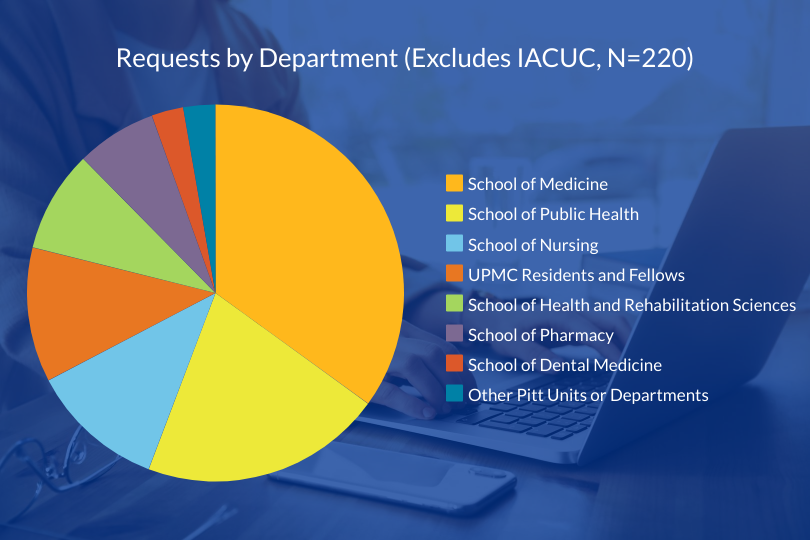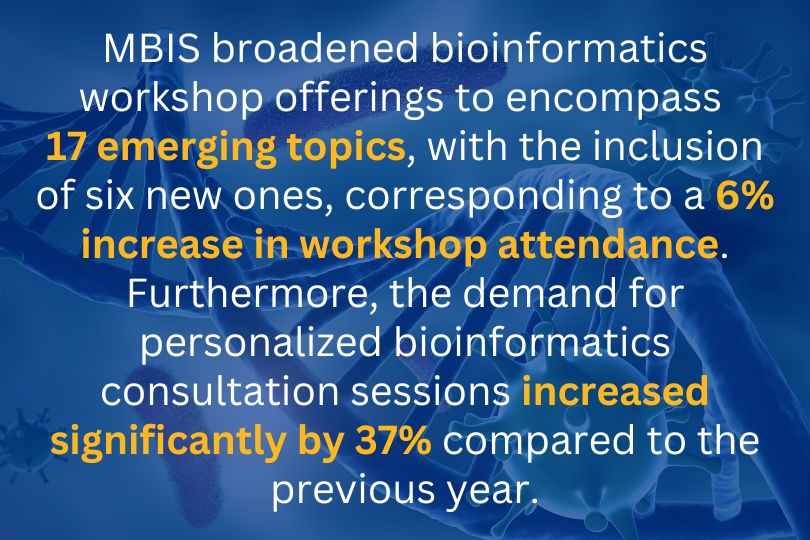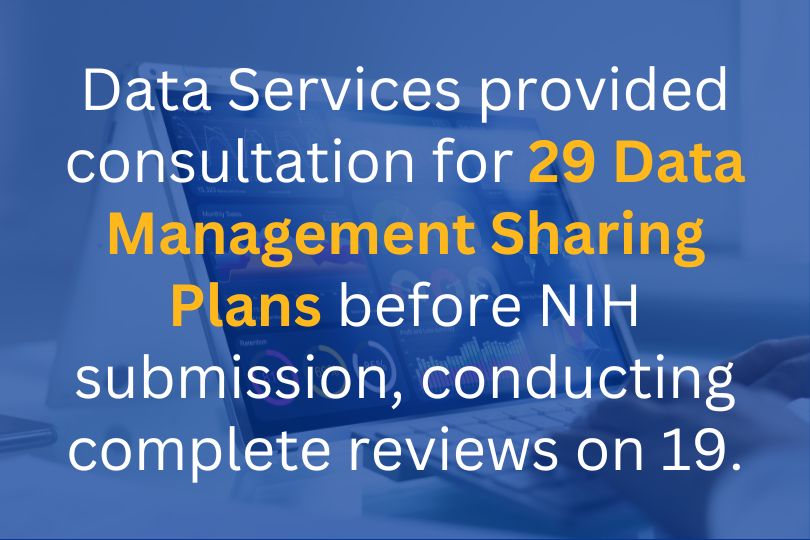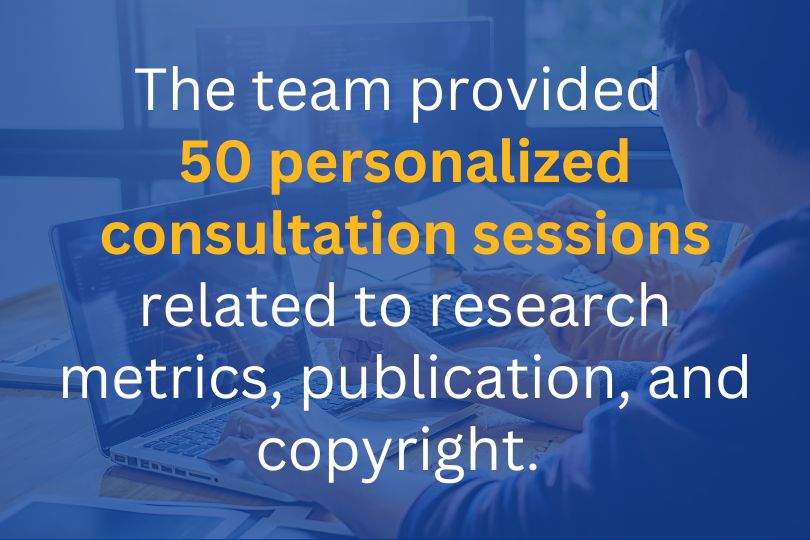FY 23 Annual Report
Health Sciences Library System
Research
Advanced Literature Searches

HSLS librarians conducted 256 mediated literature searches for health sciences faculty, with 55% of these searches spanning multiple databases, resulting in a combined 498 database searches. These originated predominantly from the School of Medicine, followed by the School of Public Health.
The chart to the right shows advanced literature searches conducted by HSLS librarians, broken down by school or unit.
IACUC librarians conducted 36 searches for faculty submitting or renewing IACUC protocols or at the request of the University of Pittsburgh IACUC.
Systematic Reviews
The Systematic Review Program received a total of 42 requests for librarian assistance, averaging 4.2 requests per month. Notably, faculty from the School of Medicine and the School of Health and Rehabilitation Sciences submitted the highest number of requests (28.5% each), followed by UPMC residents/fellows (26%), and the School of Public Health (17%), while the Schools of Pharmacy, Dental Medicine, and Nursing had no requests.
Librarians supported faculty utilizing DistillerSR software for their systematic review projects, including addressing inquiries through email and offering 14 in-person consultations.
Molecular Biology Information Services (MBIS)
HSLS licenses 11 commercial bioinformatics software and database packages, benefiting a user base of 9,291 registered individuals. Notably, since 2022, researchers affiliated with the University of Pittsburgh have referenced HSLS-licensed commercial software in 313 papers identified through Google Scholar.

Collaborative efforts with health sciences faculty resulted in valuable sessions focusing on R programming and the utilization of the All of Us Researcher Workbench. Emphasizing a dedication to addressing health disparities in research, HSLS hired a biostatistician intern and initiated bioinformatics workshops concentrating on the analysis of health and genomics data from the All of Us Research Program. A notable outcome of this initiative was the creation of a 7-week session tailored for participants in the Medical Scientist Training Program (MSTP).
MBIS embraced innovative teaching methodologies by crafting “Introduction to R” and “Data Wrangling in R” video segments. Modeled after the LinkedIn Learning approach, these concise videos feature welcoming notes from instructors, brief outlines of content, and tips for optimizing the remote learning experience. Furthermore, MBIS workshop video tutorials garnered engagement through 368 unique viewers; 2,184 views; and 366 hours viewed.
Data Services
This year marked a dedicated focus on the implementation of the NIH Data Management and Sharing Policy (DMSP), which became effective January 25, 2023. Collaboratively working with the Office of Sponsored Programs and the CTSI Responsible Conduct of Research (RCR) Center, HSLS Data Services offered expertise through a series of university-wide classes, invited presentations for individual labs and departments, and personalized consultations. This concerted effort resulted in engagement with a total of 661 researchers and administrators.
A comprehensive NIH Data Management & Sharing Policy Guide attracted significant engagement, with 3,604 views in the first few months, and our expertise was recognized nationally with requests to consult with academic libraries regarding similar support services and an invitation to sit on the DMPTool Editorial Board.

Other key DMSP accomplishments led by Data Services included: researchers from SHRS opting to assign DOIs to their NIH DMSPs for enhanced transparency; input to shape the boilerplate language for Element 6 of NIH DMSPs; and tailoring of the NIH DMSP template within the DMPTool, incorporating Pitt-specific guidance and links to ensure thoughtful responses and consistency in DMSPs from Pitt researchers.
HSLD Data Services manages the Pitt Data Catalog, now comprising 97 records.
In collaboration with the University Library System and subject matter experts across the University, Data Services played a central role in Love Data Week 2023, facilitating a diverse range of 17 educational sessions with 321 attendees. Among these, HSLS led or facilitated six sessions, involving partnerships with health sciences experts. Particularly notable sessions included discussions on open education resources for health sciences and clinical data for research.
Additionally, in line with the Pitt SEED funding initiative focused on building a data science community, Data Services organized a panel discussion on Jupyter Notebooks in Data Science Research and Education, which featured Pitt researchers and attracted participation from 34 individuals.
Scholarly Publishing and Communication Services
Scholarly Publishing and Communication Services collaborated with stakeholders across the University, aiming to minimize product duplication while offering consultations on publication and research metrics.

The team has actively engaged with various campus stakeholders, including CTSI, ULS, and IT, leading to the creation of an RFP for a faculty information system. Additionally, regular meetings were held with health sciences IT, who are developing metric dashboards. These meetings were crucial in aiding with data sources, seamless ORCID integration, and appropriate use of research metrics.
Recognizing the importance of magnifying research impact, the team embarked on an exploration to assist researchers in effectively promoting their work. As a result, a “New Media” tab was incorporated within the Scholarly Publishing and Communication LibGuide.
Twenty-three articles, written by authors in the health sciences, were published open access – free of charge – through a Read and Publish agreement with Cambridge University Press (CUP). APCs totaling $59,520 were waived for these publications. More than half of these articles were submitted to two journals: Journal of Clinical and Translational Science and Infection Control & Hospital Epidemiology





